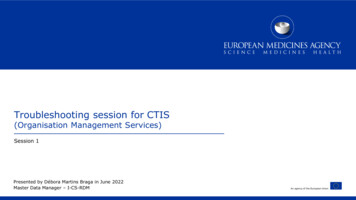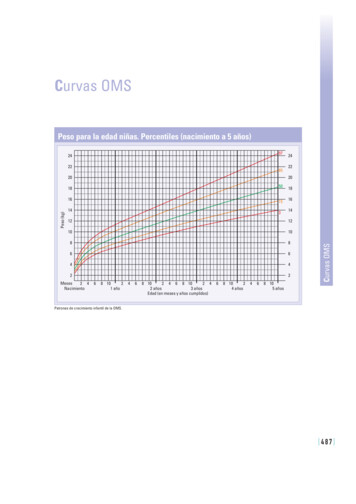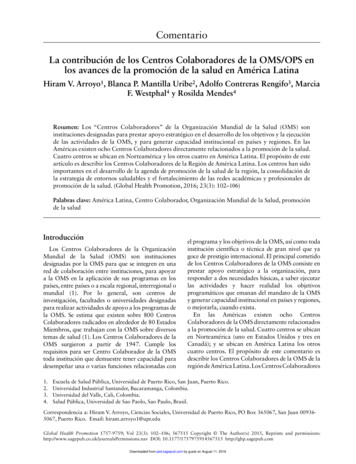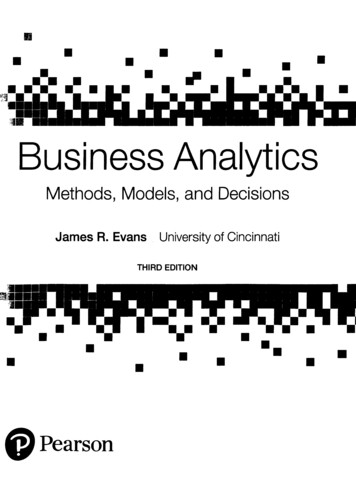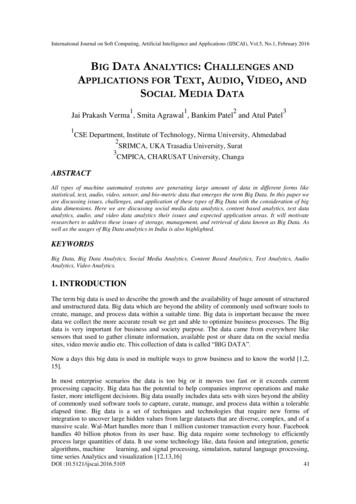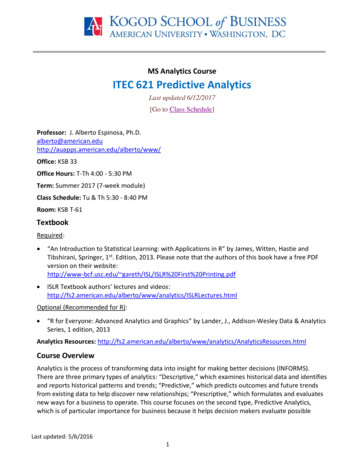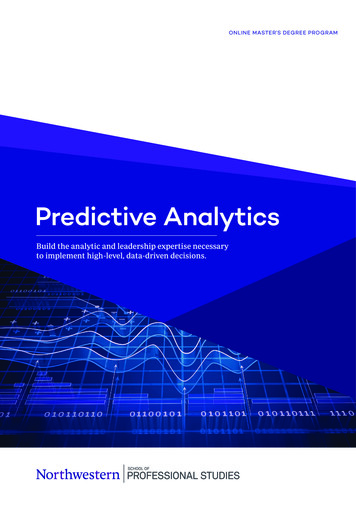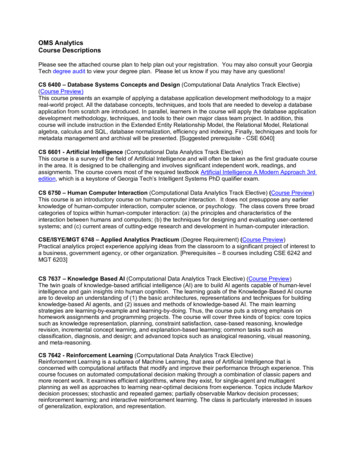
Transcription
OMS AnalyticsCourse DescriptionsPlease see the attached course plan to help plan out your registration. You may also consult your GeorgiaTech degree audit to view your degree plan. Please let us know if you may have any questions!CS 6400 – Database Systems Concepts and Design (Computational Data Analytics Track Elective)(Course Preview)This course presents an example of applying a database application development methodology to a majorreal-world project. All the database concepts, techniques, and tools that are needed to develop a databaseapplication from scratch are introduced. In parallel, learners in the course will apply the database applicationdevelopment methodology, techniques, and tools to their own major class team project. In addition, thiscourse will include instruction in the Extended Entity Relationship Model, the Relational Model, Relationalalgebra, calculus and SQL, database normalization, efficiency and indexing. Finally, techniques and tools formetadata management and archival will be presented. [Suggested prerequisite - CSE 6040]CS 6601 - Artificial Intelligence (Computational Data Analytics Track Elective)This course is a survey of the field of Artificial Intelligence and will often be taken as the first graduate coursein the area. It is designed to be challenging and involves significant independent work, readings, andassignments. The course covers most of the required textbook Artificial Intelligence A Modern Approach 3rdedition, which is a keystone of Georgia Tech’s Intelligent Systems PhD qualifier exam.CS 6750 – Human Computer Interaction (Computational Data Analytics Track Elective) (Course Preview)This course is an introductory course on human-computer interaction. It does not presuppose any earlierknowledge of human-computer interaction, computer science, or psychology. The class covers three broadcategories of topics within human-computer interaction: (a) the principles and characteristics of theinteraction between humans and computers; (b) the techniques for designing and evaluating user-centeredsystems; and (c) current areas of cutting-edge research and development in human-computer interaction.CSE/ISYE/MGT 6748 – Applied Analytics Practicum (Degree Requirement) (Course Preview)Practical analytics project experience applying ideas from the classroom to a significant project of interest toa business, government agency, or other organization. [Prerequisites – 8 courses including CSE 6242 andMGT 6203]CS 7637 – Knowledge Based AI (Computational Data Analytics Track Elective) (Course Preview)The twin goals of knowledge-based artificial intelligence (AI) are to build AI agents capable of human-levelintelligence and gain insights into human cognition. The learning goals of the Knowledge-Based AI courseare to develop an understanding of (1) the basic architectures, representations and techniques for buildingknowledge-based AI agents, and (2) issues and methods of knowledge-based AI. The main learningstrategies are learning-by-example and learning-by-doing. Thus, the course puts a strong emphasis onhomework assignments and programming projects. The course will cover three kinds of topics: core topicssuch as knowledge representation, planning, constraint satisfaction, case-based reasoning, knowledgerevision, incremental concept learning, and explanation-based learning; common tasks such asclassification, diagnosis, and design; and advanced topics such as analogical reasoning, visual reasoning,and meta-reasoning.CS 7642 - Reinforcement Learning (Computational Data Analytics Track Elective)Reinforcement Learning is a subarea of Machine Learning, that area of Artificial Intelligence that isconcerned with computational artifacts that modify and improve their performance through experience. Thiscourse focuses on automated computational decision making through a combination of classic papers andmore recent work. It examines efficient algorithms, where they exist, for single-agent and multiagentplanning as well as approaches to learning near-optimal decisions from experience. Topics include Markovdecision processes; stochastic and repeated games; partially observable Markov decision processes;reinforcement learning; and interactive reinforcement learning. The class is particularly interested in issuesof generalization, exploration, and representation.
CS 7643 – Deep Learning (Computational Data Analytics Track Elective)Deep learning is a sub-field of machine learning that focuses on learning complex, hierarchical featurerepresentations from raw data. The dominant method for achieving this, artificial neural networks, hasrevolutionized the processing of data (e.g. images, videos, text, and audio) as well as decision-making tasks(e.g. game-playing). Its success has enabled a tremendous amount of practical commercial applications andhas had significant impact on society. In this course, students will learn the fundamental principles,underlying mathematics, and implementation details of deep learning. This includes the concepts andmethods used to optimize these highly parameterized models (gradient descent and backpropagation, andmore generally computation graphs), the modules that make them up (linear, convolution, and poolinglayers, activation functions, etc.), and common neural network architectures (convolutional neural networks,recurrent neural networks, etc.). Applications ranging from computer vision to natural language processing,and decision-making (reinforcement learning) will be demonstrated. Through in-depth programmingassignments, students will learn how to implement these fundamental building blocks as well as how to putthem together using a popular deep learning library, PyTorch. In the final project, students will apply whatthey have learned to real-world scenarios by exploring these concepts with a problem that they arepassionate about.CS 7646 – Machine Learning for Trading (Computational Data Analytics Track Elective) (Course Preview)This course introduces students to the real-world challenges of implementing machine learning basedtrading strategies including the algorithmic steps from information gathering to market orders. The focus ison how to apply probabilistic machine learning approaches to trading decisions. We consider statisticalapproaches like linear regression, Q-Learning, KNN, and regression trees and how to apply them to actualstock trading situations.CSE 6040 – Computing for Data Analysis (Foundational course) (Course Preview)This course is your hands-on introduction to basic programming techniques relevant to data analysis andmachine learning. Beyond programming languages and best practices, you’ll learn elementary dataprocessing algorithms, numerical linear algebra, and numerical optimization. You will build the basiccomponents of a data analysis pipeline: collection, preprocessing, storage, analysis, and visualization.You will program in some subset of Python, R, MATLAB, and SQL, Analytical Tools the faculty'sdiscretion. This course aims to fill in gaps in your programming background, in preparation for otherprogramming-intensive courses in the OMS Analytics program. If you come to the program with asignificant programming background already, you may be eligible for exemption from this course.CSE 6242 – Data and Visual Analytics (Advanced Core) (Course Preview)This course introduces students to broad classes of techniques and tools for analyzing and visualizingdata Analytical Tools scale. It emphasizes how to combine computation and visualization to performeffective analysis. The course covers methods from each side, and hybrid ones that combine the best ofboth worlds. Topics covered include big data analytics building blocks, data collection and storage, datacleaning and integration, data visualization, dimensionality reduction, data mining concepts, graphanalytics, ensemble methods, etc. Students get experience completing significant computing assignments,and are exposed to a variety of programming languages and software. [Prerequisite - CSE 6040]{Practicum Prerequisite}CSE 6250 – Big Data Analytics in Healthcare (Computational Data Analytics Track Elective)(Course Preview)In this course we introduce the characteristics of medical data and associated data mining challenges indealing with such data. We cover various algorithms and systems for big data analytics. We focus onstudying those big data techniques in the context of concrete healthcare analytic applications such aspredictive modeling, computational phenotyping and patient similarity. We focus on studying those bigdata techniques in the context of concrete healthcare analytic applications such as: 1. Predictive modeling:e.g., how to predict disease risks on individual patients 2. Computational phenotyping: e.g., how to convertpatient data from electronic health records into meaningful clinical concepts (phenotypes)3. Patient similarity: e.g., how to measure similarity between patients within a specific context. We alsostudy big data analytic technology: 1. Scalable machine learning algorithms such as online learning andfast similarity search; 2. Big data analytic systems: a. Hadoop family (MapReduce, Hive, Pig, HBase) b.Spark (SparkSQL, MLlib and GraphX). [Suggested prerequisite CSE 6040]ISYE 6402 – Time Series Analysis (Analytical Tools Track or Statistics Elective) (Course Preview)By the end of this class students will learn standard time series analysis topics such as univariateARMA/ARIMA modeling, state-space models, (G) ARCH modeling, forecasting, model identification anddiagnostics, and multivariate time series. Students will be given fundamental grounding in the use of somewidely used tools, but much of the energy of the course is focused on individual investigation and learning.
Assignments will include both theoretical and computer problems. Topics include trend, seasonality,autocorrelation and autocovariance, ARMA and ARIMA models, multivariate time series analysis (e.g.,VAR), nonlinear models (e.g., GARCH), high-frequency data, and state-space models.ISYE 6420 – Bayesian Statistics (Analytical Tools Track or Statistics Elective) (Course Preview)This course covers the fundamentals of Bayesian statistics, including both the underlying models andmethods of Bayesian computation, and how they are applied. Modeling topics include conditional probabilityand Bayes’ formula, Bayesian inference, credible sets, conjugate and noninformative priors, hypothesistesting, Bayesian regression, empirical Bayes models, and hierarchical Bayesian models. Computationaltopics include Monte Carlo methods, MCMC, Metropolis-Hasting algorithms, Gibbs sampling, variationalBayes, and other methods for posterior approximation. Various applications of Bayesian statistics will bediscussed. [Prerequisite - Calculus-based Introductory Statistics Course]ISYE 6414 – Regression Analysis (Analytical Tools Track or Statistics Elective) (Course Preview)By the end of this class students will learn the basics of regression analysis, such as linear regression,model selection and logistic regression, as well as more advanced topics including generalized linearregression and nonparametric regression. Students will be given fundamental grounding in the use of somewidely used tools, but much of the energy of the course is focused on individual investigation and learning.Assignments will include both theoretical and computer problems. Topics include simple linear regression,multiple linear regression, variance-bias decomposition and variable selection, logistic regression,generalized linear regression, and nonparametric regression.ISYE 6501 – Introduction to Analytics Modeling (Foundational course) (Course Preview)This course gives a basic introduction to a wide variety of analytics models and techniques, including thebasic ideas behind the models, experience using software to solve/analyze them, and case studies dealingwith combining models to find a complete solution. Modeling approaches covered include classification,clustering, change detection, time series modeling, regression models, design of experiments, probabilitydistributions, probability-based models and simulation, PCA, and optimization. Cross-cutting topics like datapreparation, model validation, and variable selection are also covered.ISYE 6644 – Simulation (Analytical Tools Track or Operations Research Elective) (Course Preview)The course has three main topics: (a) Introduction to discrete-event simulation models and simulationstudies; (b) Organization of simulation languages, and modeling with Arena, a comprehensive simulationpackage with animation capabilities; and (c) Statistical aspects of simulation, including input analysis,random variate generation, output analysis, and variance reduction techniques. The course will include asmall probability/statistics review; hand simulation, spreadsheet simulation, and Arena simulation; generalmodeling concepts and examples; random variate generation including single random variable generationand random processes, input and output analysis, comparisons of systems, and variance reduction.ISYE 6669 – Deterministic Optimization (Analytical Tools Track or Operations Research Elective)(Course Preview)The course will teach basic concepts, models, and algorithms in linear optimization, integer optimization,and convex optimization. The first module of the course is a general overview of key concepts in linearalgebra, calculus, and optimization. The second module of the course is on linear optimization, coveringmodeling techniques, basic polyhedral theory, simplex method, and duality theory. The third module is onISYE 6740 - Computational Data Analysis (Analytical Tools Track, Computational Data Analytics Track orStatistics Elective) (Course Preview)Machine learning is a field of computer science that gives computers the ability to learn without beingexplicitly programmed. The course is designed to answer the most fundamental questions about machinelearning: What are the most important methods to know about, and why? How can we answer the question'is this method better than that one' using asymptotic theory? How can we answer the question 'is thismethod better than that one' for a specific dataset of interest? What can we say about the errors our methodwill make on future data? What's the 'right' objective function? What does it mean to be statistically rigorous?This course is designed to give graduate students a thorough grounding in the methods, theory,mathematics and algorithms needed to do research and applications in machine learning. The coursecovers topics from machine learning, classical statistics, and data mining. Students entering the class with apre-existing working knowledge of probability, statistics and algorithms will be Analytical Tools anadvantage, but the class has been designed so that anyone with a strong numerate background can catchup and fully participate. Some experience with coding are expected (Analytical Tools a language of yourchoice, e.g., MATLAB or Python.) [*Required for Computational Data Analytics Track as either a TrackElective or a Statistics Elective]
ISYE 7406 - Data Mining and Statistical Learning (Analytical Tools Track or Statistics Elective)(Course Preview)An introduction to some commonly used data mining and statistical learning algorithms such as K-nearestneighbor (KNN) algorithm, linear methods for regression and classification, tree-based methods, ensemblemethods, support vector machine, neural networks, and Kmeans clustering algorithm. This course focuseson the understanding of methodology, motivation, and assumptions of different algorithms as well asimplementation of these algorithms with data examples using the R statistical software.ISYE 8803 – Topics on High-Dimensional Data Analytics (Analytical Tools Track or Statistics Elective(Course Preview)This course focuses on analysis of high-dimensional structured data including profiles, images, and othertypes of functional data using statistical machine learning. A variety of topics such as functional dataanalysis, image processing, multilinear algebra and tensor analysis, and regularization in high-dimensionalregression and its applications including low rank and sparse learning is covered. Optimization methodscommonly used in statistical modeling and machine learning and their computational aspects are alsodiscussed - convex conic optimization, which is a significant generalization of linear optimization. The fourthand final module is on integer optimization, which augments the previously covered optimization models withthe flexibility of integer decision variables. The course blends optimization theory and computation withvarious applications to modern data analytics. [Suggested prerequisite ISYE 6501]MGT 6203 – Data Analytics in Business (Advanced Core) (Course Preview)Teaches the scientific process of transforming data into insights for making better business decisions. Itcovers the methodologies, algorithms, and challenges related to analyzing business data. [Suggestedprerequisite ISYE 6501] {Practicum prerequisite}MGT 6311 – Digital Marketing (Business Analytics Elective) (Course Preview)Become familiar with the key concepts and techniques utilized in modern digital marketing. Understand theprimary characteristics of various online channels including mobile marketing, email marketing, and socialmedia marketing. Gain awareness of important concepts and best practices in the use of digital marketingtools (search engine optimization, pay-per-click advertising, etc.).MGT 8803/6754 – Business Fundamentals for Analytics (Foundational course) (Course Preview)The overall objective of the course is to provide an accelerated introduction to the basics of managementand the language of business, and to provide a framework that will enhance the student’s effectiveness as amanager in the business world. The course is taught as a series of business disciplinary modules and theprofessors who teach the modules represent a diversity of functional areas: Financial Accounting, whichrelates to financial reporting and the use of accounting data for internal-to-the-business and external-to-thebusiness purposes; Managerial Accounting, which is the use of accounting data for product costing andmanagement decision-making purposes; Using Financial Analysis Techniques for Decision Making, whichprovides a general introduction to finance and capital structure; Entrepreneurial Finance, which includesvarious venture valuation methods and common sources for venture funding; Marketing, including strategyand the development of tactics to create and harvest demand for the business's products and services; andBusiness Strategy, including how businesses develop competitive advantage in the marketplace andinnovation as a key strategic weapon for driving firm revenue growth and profitability.MGT 8813 – Financial Modeling (Business Analytics Elective) (Course Preview)Financial Modeling presents tools necessary to build advanced Excel spreadsheets for business decisionmaking. Students will create spreadsheets using pivot tables, Excel functions, solver, goal seek, and VBA.The course will also include topics such as time value of money, stock and bond valuation, firm valuation,financial statements, cost of capital, option pricing models, and portfolio optimization. This course isintended to prepare students to build financial models. Therefore, two broad learning objectives exist for thiscourse: Finance-based learning objectives and excel/modeling-based learning objectives.MGT 8823 – Data Analysis for Continuous Improvement (Business Analytics Elective) (Course Preview)Because it is one thing to know how to analyze data and another thing to actually use it to solve problems,the purpose of this course is to show how mastery of data analysis can be applied to the real world. In doingso, we will explore the development of key performance indicators (KPIs) and how to use KPIs to driveimprovement in an organization. We will also discuss the four methods of continuous improvement and howdata analysis can be leveraged in each method. Because the course weaves examples from both industry
and everyday life, what is learned can be directly applied to both your personal and professional lives. Inaddition to the practical knowledge gained, students will also be shown tools that are outside of the typicalanalytics course and provided with the knowledge of how to use these tools on their own and in conjunctionwith the data analysis. Because one must know not only how to analyze data but also how to determinefrom where the actual data should come, the tools chosen will assist the student in coming up with what toanalyze in the first place.MGT 8833 – Privacy for Professionals (Business Analytics Elective) (Course Preview)This course takes a multi-disciplinary approach to the study of privacy––a current topic of great internationalinterest for those in technology, policy, law, and/or business. It prepares students to work professionally inthe privacy field, with an emphasis on U.S.-based law and practice. Course topics include introduction toprivacy, federal and state regulators and enforcement of privacy law, principles of information management,online privacy, the California Consumer Privacy Act, information security and data breach notification laws,European Union privacy laws, medical privacy, financial privacy, education privacy, workplace privacy,privacy issues in civil litigation and government investigations, and emerging issues. The professor draws onhis extensive experience in business, government, technology, and law to address current privacy debates.OMS Analytics CurriculumStatistics and Operations Research Electives
dealing with such data. We cover various algorithms and systems for big data analytics. We focus on studying those big data techniques in the context of concrete healthcare analytic applications such as predictive modeling, computational phenotyping and patient similarity. We focus on studying those big data techniques in the context of .

